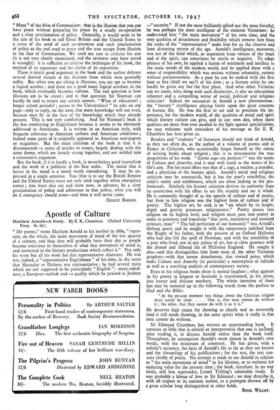Apostle of Culture
"My poems," wrote Matthew Arnold to his mother in 1869, "repre- sent, on the whole' the main movement of mind of the last quarter of a century, and thus they will probably have their day as people become conscious to themselves of what that movement of mind is, and interested in the literary productions which reflect it." Not only his verse but all his work has this representative character. He was not, indeed, a "representative Englishman" of his time, in the sense that Macaulay or Dickens was representative he had several traits which are not supposed to be particularly " English ": many-sided- ness, a European outlook and—a quality which he praised in Joubert —" amenity." If not the most brilliantly gifted nor the most forceful, he was perhaps the most intelligent of the eminent Victorians: he understood best "the main movement" of his own time, and the very qualities of detachment and flexibility which remove him from the ranks of the " representative " make him for us the clearest and least distorting mirror of the age. Arnold's intelligence, moreover, was not of the kind which, in separation from virtues of the heart and of the spirit, can sometimes be sterile or negative. To adapt phrases of his own, he applied a fusion of sentiment and intellect to the main trends of the modern world, and he applied them with a sense of responsibility which was serious without solemnity, earnest without portentousness. As a poet he can be ranked with the first four or five (shall we say?) of his time ; as a literary critic he can hardly be given any but the first place. And what other Victorian can we name, who, along with such distinction, is also an educational reformer and a compelling writer of social, political and religious criticism? Indeed we encounter in Arnold a new phenomenon: the " literary " intelligence playing freely upon the great concerns of human life. He was the first to see and to proclaim the im- portance, for the modem world, of the qualities of mind and spirit which literary culture can give and in our own day, when these qualities are more than ever needed in the fight against specialisation we may welcome such reminders of his message as Sir E. I Chambers has here given us.
Readers and " students " of literature should not think of Arnold, as they too often do, as the author of a volume of poems and of Essays in Criticism, who occasionally forgot himself to the extent of writing books about religion ; this is to misconceive the true proportions of his work. "Estote ergo vas perfecti " was the motto of Culture and Anarchy, and it may well stand as the motto of his life's aim. For his main effort was that of sage, a teacher, a moralist, and a physician of the human spirit. Arnold's social and religious criticism may be amateurish, but it has the poet's sensibility, the critic's sanity and nimbleness, which are often lacking in the pro- fessionals. Similarly his literary criticism derives its authority from its connection with his effort to see life steadily and see it whole. He is commonly thought of as the apostle of culture and of poetry, but then to him religion was the highest form of culture and of poetry. The highest art, he said, is an "art which by its height, depth and gravity possesses religiousness." Poetry passes into religion on its highest level, and religion must pass into poetry in order to penetrate and transform "that poor, inattentive and immoral creature, man." "The full perfection of our humanity" was Arnold's lifelong quest, and he sought it with the earnestness imbibed from the Rugby of his father, with the passion of an Oxford Hellenist who had also felt the spell of Newman, and with the sensibility of a poet who lived, not in any palace of art, but at close quarters with the dismal and illiberal life of Philistine England. He sought it also—and this distinguishes him from most of the other Victorian prophets—with that serene detachment, that inward -poise, which make Culture and Anarchy (in particular) a masterpiece of ridicule as well as a searching analysis of contemporary society.
Even in his religious books there is mental laughter ; what appears in his poetry as languor or lassitude is transformed, in his prose, into banter and delicate mockery. The whole intention of these last may be summed up in the following words from the preface to God and the Bible:
"At the present moment two things about the Christian religion
must surely be clear. . . One is that men cannot do without it ; the other, that they cannot do with it as it is."
He deserves high praise for showing so clearly and so reverently (and it still needs showing, in the same spirit) what it really is that men cannot do without.
Sir Edmund Chambers has written an unpretending book. It contains so little that is critical or interpretative that one is inclined, after reading it, to discuss Arnold rather than the book itself. Throughout, he summarises Arnold's work almost in Arnold's own words, with the minimum of comment. He has given, with a scholar's accuracy, the facts of Arnold's life as far as they are known and the chronology of his publications ; for the rest, the text con- sists chiefly of précis. No attempt is made to see Arnold in relation to "the main movement of mind" in his lifetime or to estimate hit enduring value for the present time ; the book, terefore, in no way rivals, still less supersedes, Lionel Trilling's admirable study. It was probably a labour of love to Sir Edmund ; we may describe it, with all respect to its eminent author, as a parergon thrown off by a great scholar long distinguished in other fields.
BASIL WILLEY.


































 Previous page
Previous page